Voters will cast their ballots in 14 sub-Saharan African states in 2015. In addition to presidential polls held in Zambia in January and Lesotho in February, voters are set to cast their ballots in Burkina Faso, Burundi, the Central African Republic (CAR), Chad, Cote d’Ivoire, Ethiopia, Guinea, Niger, Nigeria, Sudan, Tanzania and Togo. South Sudan’s first election since it gained independence in 2011, originally scheduled for June, has been pushed back to 2017 as a result of violence.
Though these elections offer an opportunity for the consolidation of democratic governance on the continent, a number are taking place in countries that are embroiled in conflict or have seen political instability in the year leading up to elections.
Burkina Faso and Burundi have experienced violence, while just three of the countries set for elections – Nigeria, Sudan and the CAR – were among the bloodiest countries in Africa in 2014. They accounted for almost 50% of the continent’s 39,000-odd conflict deaths, according to the Armed Conflict Location and Event Data project. It is possible that elections, if they go ahead as planned, may fuel further violence.
This factsheet unpacks the issues around the polls for executive leadership in these five states.
Nigeria
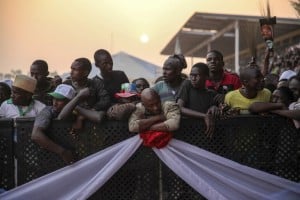 Supporters of the main opposition All Progressive Congress (APC) attend a rally on January 19, 2015. Photo: AFP/Chris Stein" />
Supporters of the main opposition All Progressive Congress (APC) attend a rally on January 19, 2015. Photo: AFP/Chris Stein" />For the first time since Nigeria’s return to democracy in 1999, the ruling People’s Democratic Party’s hold on the presidency is under threat. Former military leader Muhammadu Buhari is neck-and-neck with incumbent Goodluck Jonathan, with an Afrobarometer survey putting support for each at 42%.
The election has been beset by challenges: perennial North-South tensions have been exacerbated by Jonathan standing for office for a second term; and the Independent National Electoral Commission (INEC) has faced logistical challenges in dispensing voter cards to registered voters and to the roughly 1-million displaced through Boko Haram attacks.
Security concerns in the north-east of the country have affected polling. In early February INEC pushed the election back to 28 March due to the threat posed by Boko Haram, a move criticised by Buhari’s All Progressives Congress. Regional forces have recently made some inroads on the group; they have reclaimed several towns and are planning a major ground and air assault.
Jonathan’s waning popularity as a result of corruption scandals, high unemployment and his lacklustre handling of the Boko Haram crisis would seem to bode well for Buhari, who has extended his support in the South. However, with most of his support situated in the North, any cancellation of polling or lack of voter turnout due to Boko Haram threats may affect his chances and call the credibility of the election into question.
For more on the Nigerian election, see Africa Check’s fact sheet.
Sudan
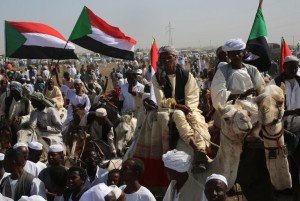 Supporters of Sudanese President Omar al-Bashir gather for a campaign rally in Sudan's east-central al-Jazirah state. Photo: AFP/Ashraf Shazly" />
Supporters of Sudanese President Omar al-Bashir gather for a campaign rally in Sudan's east-central al-Jazirah state. Photo: AFP/Ashraf Shazly" />The 2 April presidential and parliamentary elections in Sudan are likely to be a rerun of the country’s 2010 elections, the first multiparty poll in more than 20 years. In protest at President Omar al-Bashir’s unwillingness to introduce political reforms, major opposition parties are reportedly boycotting the polls.
In February 2015, the National Consensus Forces – an alliance of major opposition parties, and civil society and rebel groups – signed the Sudan Call declaration. The group seeks democratic reform: an opening of political space, a transitional government to oversee elections, and a move from authoritarian to democratic rule.
Bashir, however, has proved intransigent. Despite paying lip service to negotiation – he introduced a national dialogue process in early 2014 – he has continued to shut down opposition. Eighteen of 21 opposition groups taking part in the dialogue process have withdrawn, citing Bashir’s continued clampdown on the press, restrictions on freedom, and his decision not to release political detainees, including signatories to the Sudan Call declaration. The regime has also jailed opposition politicians who have criticised the Rapid Support Forces, a government-aligned militia accused of war crimes in Darfur. In September 2013, armed forces killed more than 170 people when they opened fire on a protest against austerity measures.
The state is embroiled in a long-running conflict with rebels on two fronts: in the western state of Darfur and in the southern states of South Kordofan and Blue Nile. With the rebels backing the Sudan Call, further violence ahead of the elections is a distinct possibility. Elections may be delayed in nine constituencies in these regions due to security issues.
Though 15 candidates have been cleared to run in the election by the electoral commission, most are little known, and none is expected to garner much support. With Bashir’s 25-year hold on power further entrenched, and little in the way of a united opposition contesting the elections, a democratic change of leadership will be off the cards for at least the next electoral cycle.
Burundi
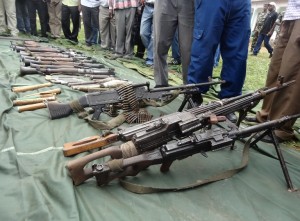 A cache of weapons captured after five days of heavy fighting between the Burundi army and rebels in the north-western part of the country in January 2015. Photo: AFP/Esdras Ndikumana" />
A cache of weapons captured after five days of heavy fighting between the Burundi army and rebels in the north-western part of the country in January 2015. Photo: AFP/Esdras Ndikumana" />Since emerging from a 12-year civil war in 2005, Burundi has continued to experience sporadic violence that is expected to persist in the run-up to the election.
Hundreds of civilians have reportedly been killed or have disappeared without trace and assailants in military uniforms killed three members of the ruling party, the National Council for the Defence of Democracy-Forces for the Defence of Democracy (CNDD-FDD) in January.
Incumbent President Pierre Nkurunziza’s bid for a third term has faced criticism ahead of the 26 June polls. While critics question the constitutionality of the move, Nkurunziza’s supporters argue that he was elected by the legislature and not popular vote for his first term, thus keeping the extension within constitutional limits. Opposition parties have also accused the government of tampering with the voter registration process.
Given the hurdles the opposition faces, it is unlikely that Nkurunziza will lose his hold on power. According to Amnesty International, the ruling party has clamped down on civil rights and liberties, and opposition politicians claim to have been jailed, harassed and attacked by members of the CNDD-FDD youth wing, Imbonerakure.
The Alliance of Democrats for Change, a coalition of most opposition parties, has yet to reach agreement on the single presidential candidate it intends fielding in the election. Further problematic is the fact that the alliance is, according to the Institute for Security Studies, an unlawful organisation: a 2011 law stipulates that coalitions may only form during election periods – meaning it cannot campaign until the government announces the start of election season.
Opposition parties in Burundi – weak and riven with factions through government interference and internal power struggles – will also only be given two weeks to campaign once their candidates have been officially registered. Their activities are further restricted in rural areas through the Imbonerakure’s reported intimidation of the electorate.
Burkina Faso
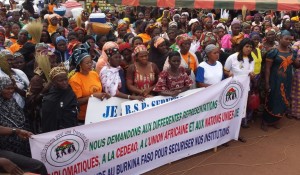 Demonstrators protest against the presidential guard in Bobo Dioulasso, the second largest town of Burkina Faso, on February 21, 2015. Photo: AFP/Romaric Hien" />
Demonstrators protest against the presidential guard in Bobo Dioulasso, the second largest town of Burkina Faso, on February 21, 2015. Photo: AFP/Romaric Hien" />In scenes reminiscent of the Arab Spring, civil action in Burkina Faso in 2014 brought President Blaise Compaoré’s 27-year reign to an end.
Ahead of the 2015 elections, Compaoré looked set to bid for a fifth term, subject to a constitutional amendment. Citizen protests saw Compaoré resign on 31 October and leave the country a few days after. In his wake, a military government under General Honore Traore claimed power, only to be replaced 24 hours later by another under Colonel Isaac Zida. Subsequent protests against military rule saw the army, civil society and political party leaders agree to a one-year transition to civilian rule under the presidency of former foreign minister Michel Kafando.
The army remains in a strong position in the transitional government, occupying a number of key decision-making posts. Zida retains power as prime minister, members of the armed forces occupy 25 of 90 cabinet posts, and the army holds five major government portfolios, including those of defence and foreign affairs.
Tensions between Zida and the presidential guard may contribute to instability ahead of the election. The guard called on Zida to resign after he had, under popular pressure, called for its disbandment. Though the dust has settled for the moment, tensions between government and the guard, the best armed force in the country, could spill over into violence if not carefully managed.
Though the opposition in Burkina Faso presented a united front against Compaoré’s bid for a fifth term, it has traditionally been divided and weak in the face of the Congress for Democracy and Progress’s (CDP) political dominance, with no party laying claim to broad national support. In 2012 legislative elections, the Union for Progress and Change was a far second to the CDP, winning 19 of the 127 available seats against the CDP’s 70. The Alliance for Democracy and Federation-African Democratic Rally won 18 seats but, having supported Compaoré’s bid to extend his term, may suffer in the October election. The Movement for Progress, a CDP splinter group that formed in January 2014, was thought to pose the largest threat to CDP rule, which may leave it in good standing for the 2015 election.
If the October elections are not considered credible, or if the military is perceived to be attempting to cling to power, citizens who for years have been denied substantive democratic rights may again attempt to change the system.
Central African Republic
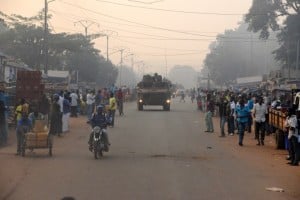 French soldiers patrol the streets of Bangui, the Central African Republic's capital. Photo: AFP/Pacome Pabandji" />
French soldiers patrol the streets of Bangui, the Central African Republic's capital. Photo: AFP/Pacome Pabandji" />The conflict that began in late 2012 with the Séléka rebel group’s march on CAR’s capital, Bangui, saw three changes of president in the space of a year. Francois Bozizé was toppled by Michel Djotodia in March 2013; Djotodia resigned in early January 2014 and was replaced by caretaker president Alexandre-Ferdinand Nguendet. Two weeks after Djotodia’s resignation, the former mayor of Bangui, Catherine Samba-Panza, was elected to act as interim president until presidential polls in February 2015.
On-going violence and a lack of funds saw the presidential polls, initially planned for early in 2015, postponed to August, with parliamentary elections set for July. On-going security issues have raised questions about whether the polls should again be pushed back to allow time for disarmament.
Both Séléka and anti-Balaka have established political wings, but their commitment to peace and electoral processes is questionable.
Three Séléka factions have formed the Patriotic Rally for the Rebirth of the Central African Republic, the Union for Peace in the Central African Republic, and a political wing of the Popular Front for the Renaissance of Central Africa. However, Séléka forces have reportedly prevented the country’s electoral authority from setting up offices in six prefectures.
Anti-Balaka, too, formed a political party late last year – the Central African Party for Unity and Development – promising to lay down arms and, instead, take its battles to the political stage. However, the group’s central authority does not have much force in localised cells. Despite a 28 January ceasefire agreement, renewed fighting has displaced about displaced about 30,000 citizens since January.
In addition to the problems posed by weak and incapacitated state institutions, electoral logistics are an issue. Voter registration is behind schedule due to security issues, a lack of personnel and missing documentation. According to a report by the Institute for Security Studies (ISS), the voter’s roll will be the most problematic aspect of the election: a national census was last held in 2003, meaning there is little clarity as to the actual population of the country. Also, in the Séléka advance, many birth and death registries were destroyed. The existing 2009 roll, likely to be used if another is not available in time, is said to be biased in favour of Bozizé’s ethnic group.
In addition to peacekeeping support, there is financial assistance from the international community for the polls, including from the EU and United Nations Development Programme. However, a February report by humanitarian news outfit IRIN noted that the electoral body faced a shortfall of 20-billion CFA franc.
Sixteen politicians have so far declared their candidacy for presidential office, but the ISS report notes that candidates have until 30 days before the election to register – and registered candidates often step aside at the last minute in return for political concessions – leaving the situation fluid.
2015 Africa election calendar
| 5 March | Togo |
| 28 March | Nigeria** |
| 2 April | Sudan** |
| 24 May | Ethiopia |
| 26 May and 26 June | Burundi** |
| 11 October | Burkina Faso** |
| 11 October | Cote d’Ivoire |
| 15 October | Central African Republic** |
| 18 October | Guinea** |
| 25 October | Tanzania |
** Presidential and parliamentary elections
Source: National Democratic Institute
Shirley de Villiers is a doctoral candidate and lecturer in the Department of Political Sciences at the University of Pretoria.


Add new comment